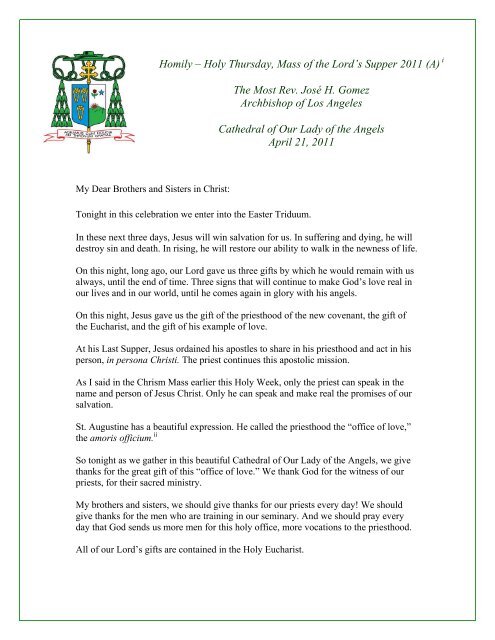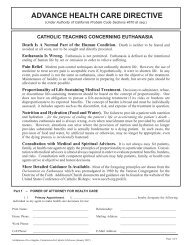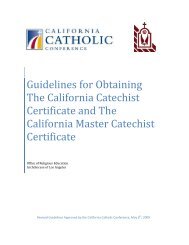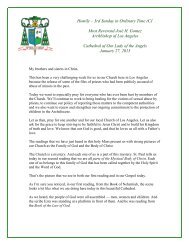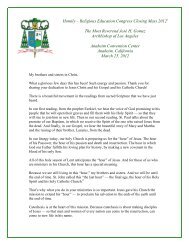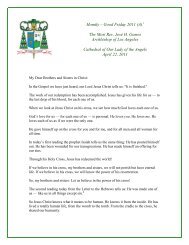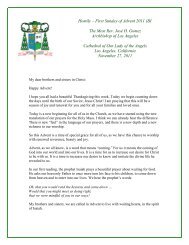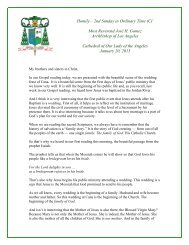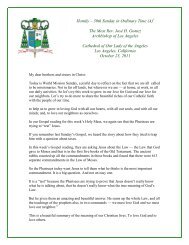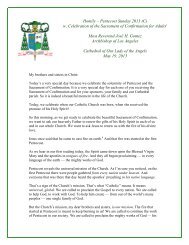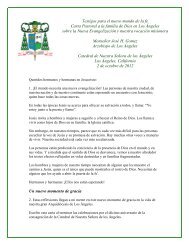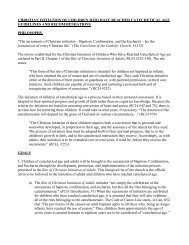Homily: Holy Thursday, Mass of the Lord's Supper 2011
Homily: Holy Thursday, Mass of the Lord's Supper 2011
Homily: Holy Thursday, Mass of the Lord's Supper 2011
Create successful ePaper yourself
Turn your PDF publications into a flip-book with our unique Google optimized e-Paper software.
<strong>Homily</strong> – <strong>Holy</strong> <strong>Thursday</strong>, <strong>Mass</strong> <strong>of</strong> <strong>the</strong> Lord’s <strong>Supper</strong> <strong>2011</strong> (A) i<br />
The Most Rev. José H. Gomez<br />
Archbishop <strong>of</strong> Los Angeles<br />
Ca<strong>the</strong>dral <strong>of</strong> Our Lady <strong>of</strong> <strong>the</strong> Angels<br />
April 21, <strong>2011</strong><br />
My Dear Bro<strong>the</strong>rs and Sisters in Christ:<br />
Tonight in this celebration we enter into <strong>the</strong> Easter Triduum. i<br />
In <strong>the</strong>se next three days, Jesus will win salvation for us. In suffering and dying, he will<br />
destroy sin and death. In rising, he will restore our ability to walk in <strong>the</strong> newness <strong>of</strong> life.<br />
On this night, long ago, our Lord gave us three gifts by which he would remain with us<br />
always, until <strong>the</strong> end <strong>of</strong> time. Three signs that will continue to make God’s love real in<br />
our lives and in our world, until he comes again in glory with his angels.<br />
On this night, Jesus gave us <strong>the</strong> gift <strong>of</strong> <strong>the</strong> priesthood <strong>of</strong> <strong>the</strong> new covenant, <strong>the</strong> gift <strong>of</strong><br />
<strong>the</strong> Eucharist, and <strong>the</strong> gift <strong>of</strong> his example <strong>of</strong> love.<br />
At his Last <strong>Supper</strong>, Jesus ordained his apostles to share in his priesthood and act in his<br />
person, in persona Christi. The priest continues this apostolic mission.<br />
As I said in <strong>the</strong> Chrism <strong>Mass</strong> earlier this <strong>Holy</strong> Week, only <strong>the</strong> priest can speak in <strong>the</strong><br />
name and person <strong>of</strong> Jesus Christ. Only he can speak and make real <strong>the</strong> promises <strong>of</strong> our<br />
salvation.<br />
St. Augustine has a beautiful expression. He called <strong>the</strong> priesthood <strong>the</strong> ―<strong>of</strong>fice <strong>of</strong> love,‖<br />
<strong>the</strong> amoris <strong>of</strong>ficium. ii<br />
So tonight as we ga<strong>the</strong>r in this beautiful Ca<strong>the</strong>dral <strong>of</strong> Our Lady <strong>of</strong> <strong>the</strong> Angels, we give<br />
thanks for <strong>the</strong> great gift <strong>of</strong> this ―<strong>of</strong>fice <strong>of</strong> love.‖ We thank God for <strong>the</strong> witness <strong>of</strong> our<br />
priests, for <strong>the</strong>ir sacred ministry.<br />
My bro<strong>the</strong>rs and sisters, we should give thanks for our priests every day! We should<br />
give thanks for <strong>the</strong> men who are training in our seminary. And we should pray every<br />
day that God sends us more men for this holy <strong>of</strong>fice, more vocations to <strong>the</strong> priesthood.<br />
All <strong>of</strong> our Lord’s gifts are contained in <strong>the</strong> <strong>Holy</strong> Eucharist.
Page 2 <strong>of</strong> 4<br />
The priesthood flows from <strong>the</strong> Eucharist and serves <strong>the</strong> Eucharist. And Jesus shows us<br />
<strong>the</strong> ―inner logic‖ <strong>of</strong> <strong>the</strong> Eucharist — why <strong>the</strong> Eucharist is so important in <strong>the</strong> Gospel<br />
this evening. He does this with his example <strong>of</strong> washing his disciples’ feet.<br />
In <strong>the</strong> Eucharist, we proclaim <strong>the</strong> Lord’s death, St. Paul tells us today in <strong>the</strong> second<br />
reading.<br />
Jesus turned his death on <strong>the</strong> cross into a prayer — a sacrifice <strong>of</strong> thanksgiving <strong>of</strong>fered<br />
for us. He became our Passover lamb, as we heard in <strong>the</strong> first reading. His blood<br />
became <strong>the</strong> sign <strong>of</strong> our salvation.<br />
The Eucharist shows us <strong>the</strong> cross and tells us how much God loves each one <strong>of</strong> us. But<br />
we can never separate his cross from his resurrection. The Eucharist is also a promise<br />
for <strong>the</strong> future.<br />
Paul tells us tonight: we proclaim <strong>the</strong> Lord’s death until he comes.<br />
The One who comes to us in this celebration is <strong>the</strong> One who has risen. He is <strong>the</strong> One<br />
who died and behold is alive for evermore. iii<br />
And because he has risen, we know that we will also rise. Jesus not only died for us. He<br />
rose for us also!<br />
The Eucharist is <strong>the</strong> sacrament <strong>of</strong> this great hope that we have <strong>of</strong> eternal life.<br />
Jesus gave us his word on this: ―He who eats my flesh and drinks my blood has eternal<br />
life, and I will raise him up on <strong>the</strong> last day.‖ iv<br />
We can really understand that <strong>the</strong> Eucharist is <strong>the</strong> center <strong>of</strong> <strong>the</strong> Christian life.<br />
That’s why St. Ignatius <strong>of</strong> Antioch, a Fa<strong>the</strong>r <strong>of</strong> <strong>the</strong> Church who was a disciple <strong>of</strong> St.<br />
John <strong>the</strong> Apostle, called <strong>the</strong> Eucharist: ―a medicine <strong>of</strong> immortality, an antidote <strong>of</strong><br />
death.‖ v<br />
My bro<strong>the</strong>rs and sisters, we need to live with <strong>the</strong> Eucharistic faith <strong>of</strong> <strong>the</strong> early<br />
Christians!<br />
St. Ignatius was a bishop who was condemned to die by <strong>the</strong> Roman Emperor in <strong>the</strong><br />
early second century. He wrote beautiful letters, especially while he was being<br />
transported in a cage to Rome for his execution.<br />
In <strong>the</strong>se letters he described his death as a sacrifice to God. He knew that he was about<br />
to die. And he knew he was going to be fed to <strong>the</strong> lions. It was a horrible, horrible<br />
martyrdom. And he wrote this: ―I am <strong>the</strong> wheat <strong>of</strong> God! So let me be ground by <strong>the</strong><br />
teeth <strong>of</strong> <strong>the</strong> wild beasts, that I may be found <strong>the</strong> pure bread <strong>of</strong> Christ.‖ vi
Page 3 <strong>of</strong> 4<br />
A person doesn’t think about his death that way unless he has already been living his<br />
life that way. Ignatius was formed by <strong>the</strong> Eucharist. He thought <strong>of</strong> his body and blood<br />
— he thought <strong>of</strong> his life — as <strong>the</strong> Eucharist. The center <strong>of</strong> his life was <strong>the</strong> Eucharist.<br />
We can say that he lived his life Eucharistically. And this is how we must live our lives<br />
too. Our Christian life, our whole life, must be centered in <strong>the</strong> Eucharist.<br />
This is what our Lord is teaching us today in <strong>the</strong> Gospel when he washes his disciples’<br />
feet.<br />
In that time, foot washing was a job for servants. That’s why <strong>the</strong> apostles were so upset.<br />
They didn’t get it. They were seeing only <strong>the</strong> external sign.<br />
Jesus tells <strong>the</strong>m: ―Afterward you will understand.‖ Yes, <strong>the</strong>y were able to understand<br />
after his crucifixion, after his resurrection.<br />
In this one beautiful symbol, Jesus shows us <strong>the</strong> meaning <strong>of</strong> his whole life — and <strong>the</strong><br />
inner logic <strong>of</strong> <strong>the</strong> Eucharist.<br />
He takes <strong>of</strong>f his outer garment in a sign <strong>of</strong> humility. And he bends down to serve.<br />
The Eucharist is going to take us to humility and service. Jesus, perfect God and perfect<br />
man, is giving us an example <strong>of</strong> absolute and complete service. It shows us, my bro<strong>the</strong>rs<br />
and sisters, how much we are worth to God. Jesus Christ kneels before you to wash<br />
your feet. He <strong>of</strong>fers his body for you on <strong>the</strong> cross. He <strong>of</strong>fers his Body and Blood to be<br />
food for you in <strong>the</strong> Eucharist.<br />
So tonight, we have to ask for <strong>the</strong> grace to correspond to God’s love for us. We will do<br />
that if we follow Jesus’ example — <strong>the</strong> witness <strong>of</strong> love that he showed us washing <strong>the</strong><br />
feet <strong>of</strong> <strong>the</strong> apostles, <strong>the</strong> witness <strong>of</strong> love that he showed us giving his life for each one <strong>of</strong><br />
us in on <strong>the</strong> cross.<br />
That’s <strong>the</strong> call that we have. That’s our Christian call: to imitate <strong>the</strong> life <strong>of</strong> our Lord<br />
Jesus Christ. And we do that, my bro<strong>the</strong>rs and sisters, if we have <strong>the</strong> Eucharist as <strong>the</strong><br />
center <strong>of</strong> our lives.<br />
We are called to present our lives as living sacrifices to God. To <strong>of</strong>fer everything we do<br />
as a spiritual sacrifice <strong>of</strong> praise. vii<br />
Everything can be centered in <strong>the</strong> Eucharist. Every little thing that you do every day<br />
must be centered in <strong>the</strong> Eucharist.<br />
Again tonight, let us ask for <strong>the</strong> grace to have <strong>the</strong> Eucharist as <strong>the</strong> center and source <strong>of</strong><br />
our Christian lives.
Page 4 <strong>of</strong> 4<br />
Let us ask Mary, Our Blessed Mo<strong>the</strong>r, for her intercession. That we all can live our<br />
lives Eucharistically. That we can be Eucharistic souls, and be able to turn everything<br />
we do into a prayer, in perfect union with our Lord Jesus Christ, starting with a real<br />
commitment to service <strong>of</strong> God and one ano<strong>the</strong>r.<br />
i Readings: Exod. 12:1–8, 11–14; Ps. 116:12–13, 15–18; 1 Cor. 11:23–26; John 13:1–15.<br />
ii Tractates on <strong>the</strong> Gospel <strong>of</strong> St. John, 123:5; compare Benedict XVI, Saramentum Caritatis, 23.<br />
iii Rev. 1:18.<br />
iv John 6:54.<br />
v To <strong>the</strong> Ephesians, 20.<br />
vi Aquilina, The Fa<strong>the</strong>rs <strong>of</strong> <strong>the</strong> Church, rev. ed. (Our Sunday Visitor, 2006), 65.<br />
vii Matt. 16:24–25; 1 John 3:16–18; Rom. 12:1; Heb. 13:15; 1 Pet. 2:5.


